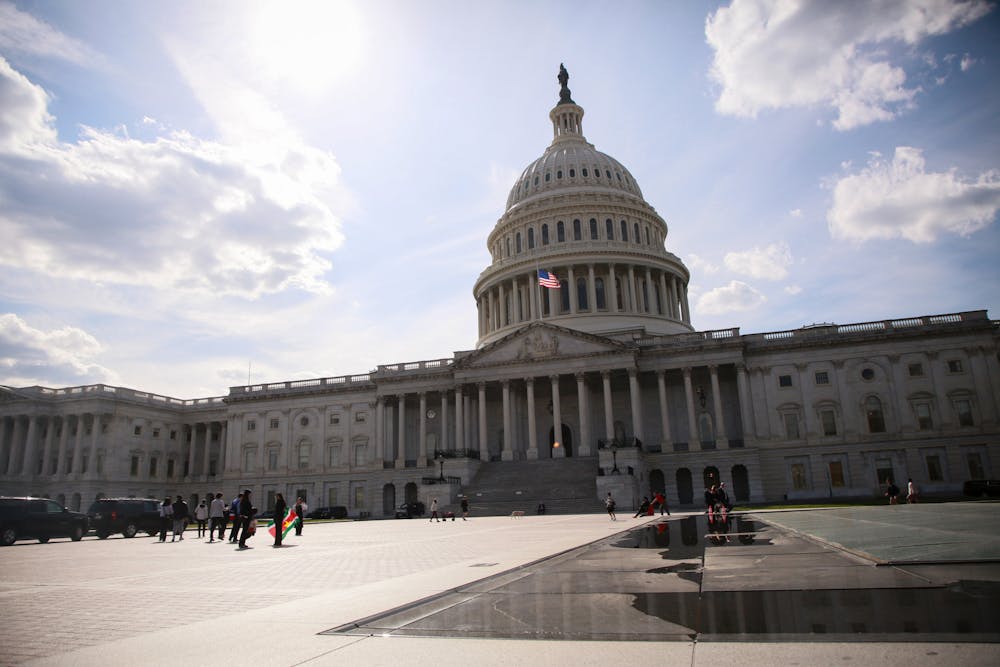Over 20 members of Congress sent a letter to President Liz Magill, criticizing the University of Pennsylvania's response to Hamas' attack on Israel.
The letter was sent on Nov. 1 and asserted that the administration’s response was untimely and put the University’s moral compass and commitment to counterviolence in question. Rep. Ralph Norman (R-S.C.) was the lead member in the effort to send the letters.
“Silence in this case is resounding applause for the acceptance of evil,” the letter wrote.
The 26 Republican legislators sent nearly identical letters, except for individualized paragraphs about specific incidents involving events and faculty members, to senior administrators at four other Ivy League universities — Yale University, Columbia University, and Harvard University.
In a message to the Penn community on Oct. 10, Magill wrote she was "devastated by the horrific assault on Israel" by Hamas. On Oct. 15, Magill sent a second statement, explicitly condemning the Hamas attack and emphasizing the Penn's stance on antisemitism. Her second statement referred to the Hamas violence as a "terrorist assault," a change from her initial statement.
The representatives denounced the Palestine Writes Literature Festival and the University’s decision to allow it to happen on campus. The signatories wrote that the speakers invited had a history of antisemitic language and that such language continued during the event.
“The fact that [the University] was aware of and allowed known antisemitic speakers to come to campus is not only dangerous but shows a severe lack of judgment, which calls into question the leadership and values of your institution,” the letter wrote.
In her Oct. 15 statement, Magill said that the University could have taken a clearer stance on its view on the Palestine Writes Literature Festival, distancing Penn from festival speakers who, she wrote, had a "public history of speaking out viciously against the Jewish people."
Related:
Penn's chair of Wharton Board of Advisors calls for Magill, Bok to resign over 'antisemitism'
Penn antisemitism action plan draws mixed reactions from University community
"The University did not, and emphatically does not, endorse these speakers or their views," Magill wrote on Oct. 15. "While we did communicate, we should have moved faster to share our position strongly and more broadly with the Penn community."
The letter described the University’s actions in response to the violence in Israel as inadequate and delayed — writing that they violated the core values of education.
“[Penn’s] inaction allows these voices of hate and violence to thrive, casting a shadow over the entire university community,” the letter wrote.
The letter outlined actions that the signatories encouraged Magill and the University to take going forward.
“It is your responsibility to condemn this terrorist attack unequivocally and publicly, disassociate the university from any student organization or professor endorsing violence, and take concrete steps to ensure that such ideologies that support and defend the actions of antisemitism find no refuge at [the University],” the letter wrote.
On Nov. 1, Magill announced a University-wide action plan to combat antisemitism, focusing on improving safety and security, engagement, and education on campus.
"This is an incredibly challenging moment in the world, and we are feeling its reverberations on our campus," Magill wrote in the announcement. "We can and will do better to combat antisemitism and to reject hate in all its forms."
In a press release on Wednesday, Norman wrote that he had sent the letters to "express profound disappointment in administrators for their half-hearted, hypocritical, or absent responses to the outrageous protests by student organizers and certain professors."
“The delay in response by these universities in conjunction with their outright support of these student organizations and professors sends a message of indifference and alienates part of their own student body,” he wrote. “The message from these universities is clear, not only to the victims of the attacks but to the victims of terrorism globally.”
This is the latest in a series of letters addressing the University’s response to the Israel-Hamas war, the Palestine Writes festival, and antisemitism on campus. Several notable donors, including Ronald Lauder, Jon Huntsman Jr., and Stephen Levin, have written letters to Magill withdrawing their financial support from Penn.
Hundreds of Penn faculty members signed an open letter calling on the University community to condemn the Hamas attacks on Israel and support Israel’s right to defend itself, while three Commonwealth trustees declared their support for Magill and University Board of Trustees Chair Scott Bok in a separate letter.
On Nov. 3, Magill and Bok pledged to regain the trust and support of alumni at a Board of Trustees meeting, where Magill again condemned acts of antisemitism and said that Penn will investigate any hateful incidents.
“I have heard from some that I have not been as effective as I could have been or should have been," Magill told the trustees as part of an eight-minute speech. "This left room for doubt. Doubt about my convictions, what our university believes, and how Penn moves forward. I regret that, and I am listening."









